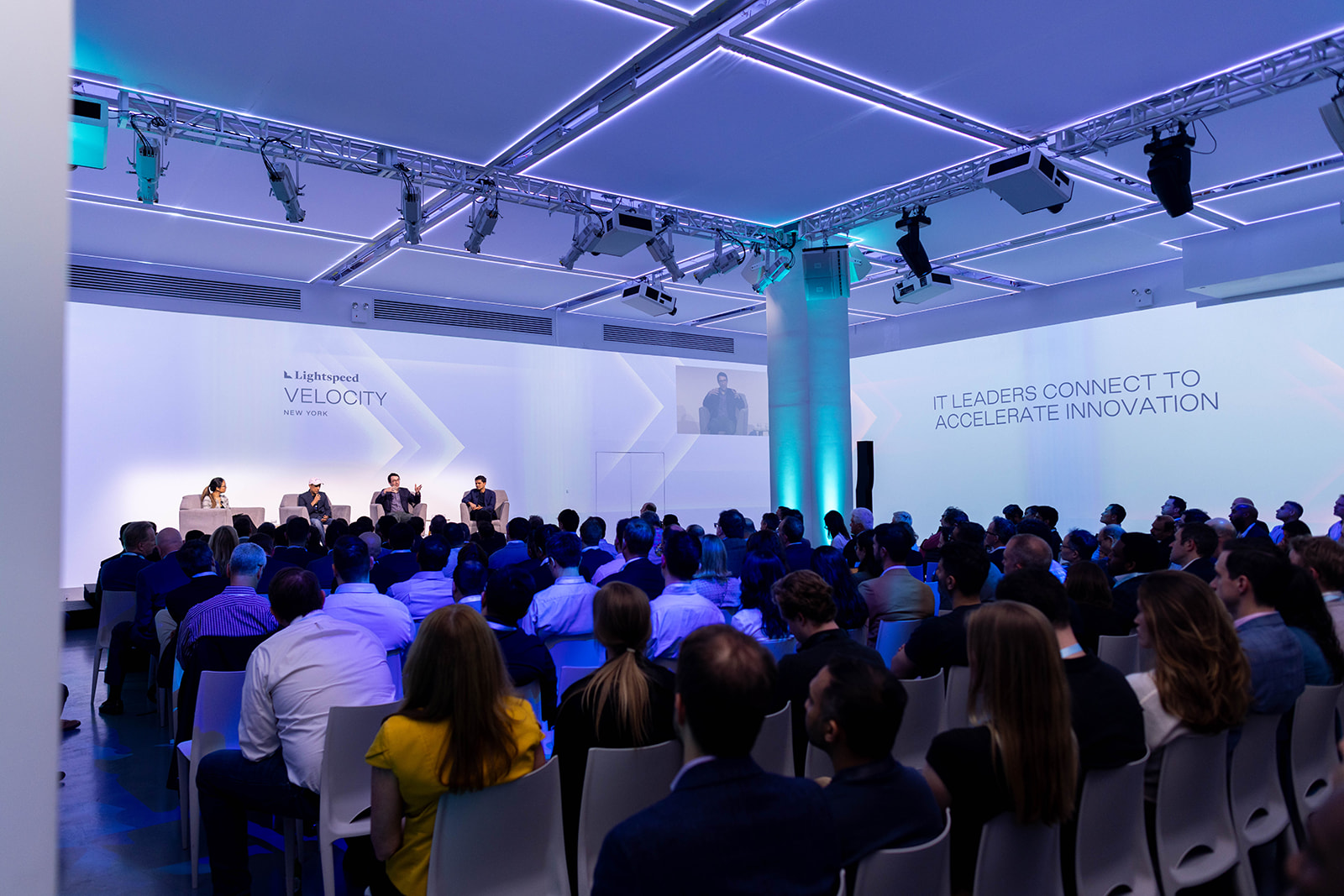07/17/2024
Enterprise
Highlights from Lightspeed Velocity NYC 2024
Insights on Enterprise AI from Moveworks, Snorkel, and Glean.

Last month, over two hundred people gathered at Velocity NYC 2024, Lightspeed’s flagship event for enterprise IT and innovation leaders. On the agenda? Learn about trends and insights driving disruption and shaping the future of enterprise technology, with a focus on enterprise AI.
The evening was anchored by an Innovation Showcase, featuring brief presentations from 12 early-stage enterprise startups that Lightspeed has invested in – including Blink, Descope, Endor Labs, Fiddler, Mistral AI, Patronus AI, P0 Security, Observo.ai, Redpanda, ScaleOps and Tessell – on their products and solutions, as well as a fireside chat on the state and future of AI in the enterprise, featuring repeat founders of emerging enterprise AI solution leaders, Arvind Jain, Co-Founder & CEO of Glean; Alex Ratner, Co-Founder & CEO of Snorkel; and Bhavin Shah, Co-Founder & CEO of Moveworks. The conversation was moderated by Lightspeed Partner Lisa Han, who has deep expertise in early-stage product-oriented startups, and yielded insights for enterprise IT and innovation executives, entrepreneurs, and investors.
Below are key takeaways from the discussion (that have been edited for clarity.)
Experimentation is key.
Asked to describe companies that are successfully integrating AI into their operations, Glean’s Arvin Jain described a “mindset” of “experimentation mode,” and the importance of trying out several approaches at a time.
AI needs to be specialized.
Large companies, Snorkel’s Alex Ratner said, “have to structurally optimize for the mass market flood of interest in big generalist models.” But to get differentiated business value from AI, businesses need to lean into specializing AI on their unique data. “Many of you are only going to succeed if you focus on specialist models that are accurate and efficient and cost effective at your use cases,” he said.
Startups offer independence.
There was extensive discussion over whether there exists an incumbent advantage in AI. But the panelists agreed that the contribution of new players would continue to be critical. “Obviously the hyperscalers will continue to benefit from this wave,” said Bhavin Shah of Moveworks, but “what startups give you is true independence.” While incumbent companies can build AI into their existing systems, making them “a little bit smarter, a little bit faster,” he explained, new enterprises bring the outside perspective to figure out how to optimize it in new ways, “to create these really rich experiences across all these application boundaries. That’s where we’re seeing a lot of innovation, a lot of investment, the kind of thinking around how to create new companies.”
AI’s value can be measured, but most companies aren’t doing that yet.
Ratner lamented that a lot of companies are still basing decisions about AI adoption on “vibes.” “Does this chat bot seem like it’s cool and exciting? And as many of us know, to cross the chasm from that flashy chat bot demo to real production ROI and value, you have to be able to measure that value, right? To convince many of you from finance, where we work with six of the top 10 US banks, you need to be able to actually give more than just a vibes check, right? To deploy something. So evaluation from the startup procurement to actual production deployment is super critical. And it’s not easy.” Ratner emphasized the importance of asking, “What is the actual success measure? How do we score it?” He characterized the prevalent mindset as “make it perfect and shiny, and then we’ll ship it over to the line of business. That’s how projects in AI fail. In my experience.”
One model cannot solve all problems.
Whatever the problem, Bhavin Shah of Moveworks advises using many models to get to the right solution. “Using GPT4 for everything is like taking a rocket ship to the grocery store,” he said. “It just doesn’t make sense.” Indeed, the same could be said for the challenges within enterprise AI itself. As Lisa Han said at the end of the discussion, the only way to solve the problems in enterprise AI is to “have a purview that is agnostic, which really paves the way for new entrants and new companies to own that workflow from end to end.”
In sum.
At every turn, the discussion revealed the crucial role of startups in innovating AI and in allowing the business world to stay flexible and creative in its approach to machine learning. In a post on LinkedIn summarizing the event, Alex Ratner captured the sentiment in the room, writing, “2024 is the year we all have to cross the chasm from flashy chatbot demo to real production demo – excited to cut a path through the hype together!”
Interested in attending the next Velocity event in NYC or SF? We’d love to see you there! Please add your contact information so we can be in touch.



